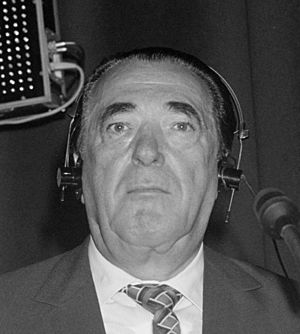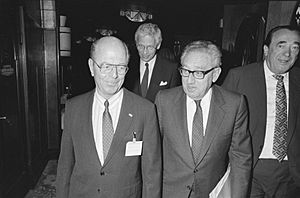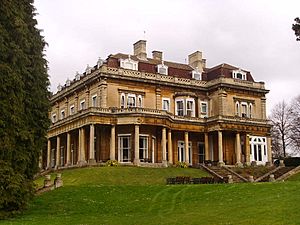Robert Maxwell facts for kids
Quick facts for kids
Robert Maxwell
|
|
|---|---|

Maxwell at the Global Economic Panel in Amsterdam (1989)
|
|
| Member of Parliament for Buckingham |
|
| In office 15 October 1964 – 29 May 1970 |
|
| Preceded by | Sir Frank Markham |
| Succeeded by | Sir Bill Benyon |
| Personal details | |
| Born |
Ján Ludvík Hyman Binyamin Hoch
10 June 1923 Slatinské Doly, Czechoslovakia (now Solotvyno, Ukraine) |
| Died | 5 November 1991 (aged 68) Sea around the Canary Islands, Spain |
| Resting place | Mount of Olives Jewish Cemetery, Jerusalem |
| Citizenship | Czechoslovak British (since 1946) |
| Political party | Labour |
| Spouse |
Elisabeth Meynard
(m. 1945) |
| Children | 9, including Christine, Isabel, Ian, Kevin and Ghislaine |
| Occupation |
|
| Military service | |
| Allegiance |
|
| Branch/service |
|
| Years of service | 1940–1945 |
| Rank | Captain |
| Battles/wars | World War II |
| Awards | Military Cross |
Robert Maxwell (born Ján Ludvík Hyman Binyamin Hoch; June 10, 1923 – November 5, 1991) was a British media proprietor and Member of Parliament (MP). He was born in Czechoslovakia.
Maxwell escaped from Nazi occupation in his home country. He joined the Czechoslovak Army in exile during World War II. He received awards for his bravery while serving in the British Army.
After the war, he worked in publishing. He built up Pergamon Press into a major academic publishing company. He served as a Labour MP for six years in the 1960s. After that, Maxwell focused on his businesses again. He bought British Printing Corporation, Mirror Group Newspapers, and Macmillan Publishers.
Maxwell lived a very fancy lifestyle. He lived in Headington Hill Hall in Oxford. He often flew in his helicopter or sailed on his luxury yacht, the Lady Ghislaine. He was often involved in disagreements with others. In 1989, Maxwell had to sell some of his successful businesses, like Pergamon Press, to pay off his debts. In 1991, his body was found in the Atlantic Ocean. It seemed he had fallen overboard from his yacht. He was buried in Jerusalem.
Maxwell's death caused his publishing empire to collapse. Banks demanded that he repay his loans. His sons tried to keep the businesses going, but they failed. News came out that Maxwell had used hundreds of millions of pounds from his companies' pension funds without permission. The Maxwell companies went bankrupt in 1992.
Contents
Early Life and War Service
Robert Maxwell was born into a poor Yiddish-speaking Orthodox Jewish family. This was in the small town of Slatinské Doly, Czechoslovakia. His parents were Mechel Hoch and Hannah Slomowitz. He had six brothers and sisters.
In 1939, the area where he lived became part of Hungary. Most of Maxwell's family were killed in Auschwitz in 1944. But Maxwell had escaped to France years earlier. In May 1940, he joined the Czechoslovak Army in exile.
After France fell and the British army retreated, Maxwell joined the Royal Pioneer Corps. He later moved to the North Staffordshire Regiment in 1943. He fought across Europe, from the beaches of Normandy to Berlin. He became a sergeant. In 1945, Maxwell became a captain.
In January 1945, Maxwell showed great bravery during the war. He stormed a German machine-gun nest. For this, he received the Military Cross award. It was given to him by Field Marshal Bernard Montgomery. After the war, he worked in Berlin for two years in the press section. Maxwell became a British citizen in 1946. He officially changed his name in 1948.
Starting a Publishing Empire
After the war, Maxwell used his connections to start a business. He became a distributor for Springer Verlag, a publisher of scientific books. In 1951, he bought most of a small publisher called Butterworth-Springer. He changed the company's name to Pergamon Press. He quickly built it into a major publishing house.
In 1964, Maxwell became a Member of Parliament for Buckingham. He was re-elected in 1966. He lost his seat in 1970 to Conservative challenger William Benyon.
In 1969, Maxwell tried to buy the newspaper News of the World. But the family who owned it did not want a Czechoslovak immigrant with socialist ideas to own their paper. The newspaper was later bought by Australian businessman Rupert Murdoch.
Business Challenges and Growth
In 1969, a company called Leasco Data Processing Corporation wanted to buy Pergamon Press. The head of Leasco, Saul Steinberg, said Maxwell had lied about how profitable one of his companies was. Pergamon's share trading was stopped on the London stock markets.
Maxwell lost control of Pergamon and was removed from its board in October 1969. An official inquiry found that Maxwell had tried to make Pergamon's share price higher. He did this by making deals between his private family companies. The report said Maxwell could not be trusted to manage a public company properly.
However, a judge later criticized the inquiry. He said the inspectors had acted unfairly towards Maxwell. The company did not do well under Steinberg's ownership. Maxwell bought Pergamon back in 1974 after borrowing money.
In 1981, Maxwell bought the British Printing Corporation (BPC). He changed its name to Maxwell Communication Corporation (MCC).
Expanding the Media Empire
In July 1984, Maxwell bought Mirror Group Newspapers. This company published six British newspapers, including the Daily Mirror. This led to a media rivalry between Maxwell and Rupert Murdoch.
Mirror Group Newspapers published the Daily Mirror, Sunday Mirror, and other papers. Maxwell said his editors would be "free to produce the news without interference."
In 1985, Maxwell announced he would take over Clive Sinclair's struggling home computer company, Sinclair Research. But the deal did not happen. In 1987, he started a new newspaper called the London Daily News. It closed after only a few months because it lost a lot of money.
By 1988, Maxwell's companies owned many businesses. These included the Mirror newspapers, Pergamon Press, Nimbus Records, and Berlitz language schools. He also owned part of MTV in Europe. In 1988, he bought Macmillan Publishers, an American firm. The same year, he started an ambitious new newspaper called The European.
In 1991, Maxwell had to sell Pergamon to pay his debts. He used some of this money to buy the Daily News in New York City.
Maxwell was known for being very strict with people who spoke or wrote against him. The satirical magazine Private Eye often made fun of him. Maxwell sued Private Eye several times.
Sports and Final Years

Maxwell was also the chairman of Oxford United, a football club. He saved them from going bankrupt. He tried to combine them with another club, Reading, in 1983. He wanted to call the new team "Thames Valley Royals". Oxford United reached the top division of English football in 1985. They won the League Cup a year later. Maxwell used the club's old stadium to land his helicopter. Fans would chant, "He's fat, he's round, he's never on the ground." Maxwell also bought into Derby County in 1987. He tried to buy Manchester United in 1984, but the owner asked for too much money.
Death and Aftermath
On November 4, 1991, Maxwell was on his yacht, the Lady Ghislaine, near the Canary Islands, Spain. On November 5, he was found to be missing from the yacht. His body was later found in the Atlantic Ocean. There were no major injuries on his body. An official investigation in December 1991 ruled that he died from a heart attack.
Maxwell had a grand funeral in Israel. Many important people attended, including the Israeli Prime Minister and President. He was buried on the Mount of Olives in Jerusalem.
British Prime Minister John Major said Maxwell had given him "valuable insights" into the situation in the Soviet Union. Neil Kinnock, the Labour Party leader, said Maxwell was a man with "a zest for life."
After Maxwell's death, his publishing empire became unstable. Banks demanded that he repay their huge loans. His sons, Kevin and Ian, tried to keep the businesses going, but they failed. It was discovered that Maxwell had used hundreds of millions of pounds from his companies' pension funds without proper permission. He did this to try and save his companies from going bankrupt.
Eventually, money from investment banks and the British government helped to put money back into the pension funds. This meant that most pensioners received about half of their company pension. The Maxwell companies went bankrupt in 1992. In 1995, Kevin, Ian, and two other former directors were put on trial. They were accused of trying to cheat people. But they were found not guilty the next year.
Family Life
In 1945, Maxwell married Elisabeth "Betty" Meynard. She was a French Protestant. They had nine children over 16 years: Michael, Philip, Ann, Christine, Isabel, Karine, Ian, Kevin and Ghislaine. Five of his children – Christine, Isabel, Ian, Kevin and Ghislaine – later worked in his companies.
His daughter Karine died at age three from leukaemia. His son Michael was badly hurt in a car crash in 1961 when he was 15. Michael never woke up and died seven years later.
In November 1994, Maxwell's wife Elisabeth published her memories. The book was called A Mind of My Own: My Life with Robert Maxwell. It shared details about her life with him. Elisabeth later spent much of her life researching the Holocaust. She also worked to improve understanding between Jewish and Christian people. She passed away on August 7, 2013.
Images for kids
-
Global Economic Panel April 1989 in Amsterdam: Wisse Dekker, minister Hans van den Broek, Henry Kissinger and Robert Maxwell.
See also
 In Spanish: Robert Maxwell para niños
In Spanish: Robert Maxwell para niños
- Daily News (Perth, Western Australia) §1980–1990
- List of people who disappeared mysteriously at sea
- Maxwellisation
- Scottish Daily News
 | Anna J. Cooper |
 | Mary McLeod Bethune |
 | Lillie Mae Bradford |




